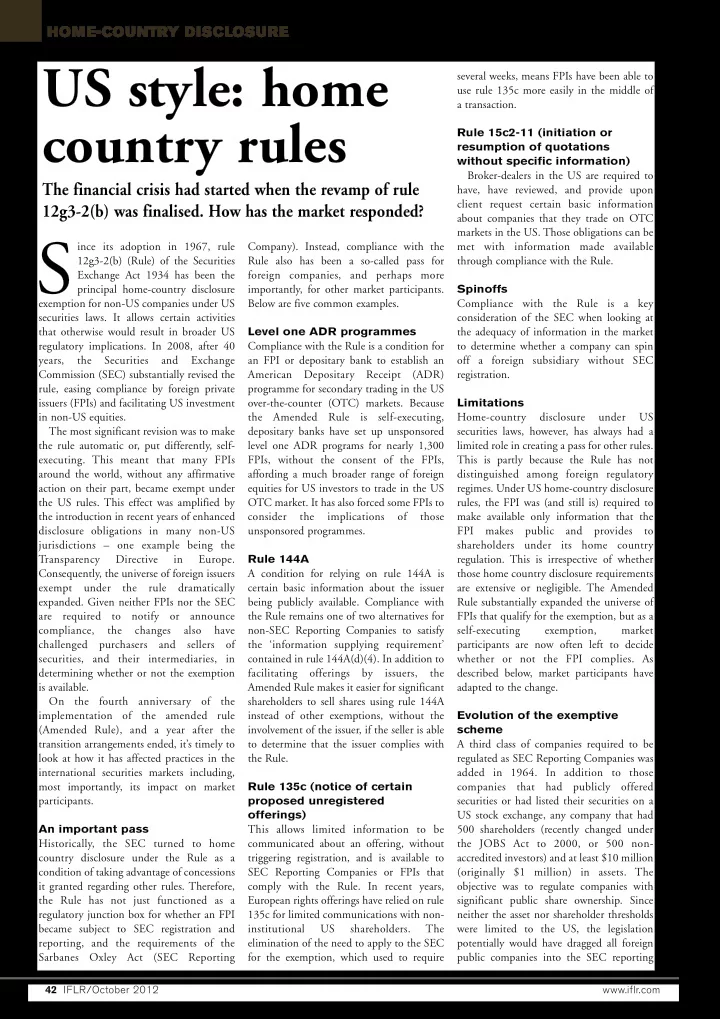

HOME-COUNTRY DISCLOSURE US style: home several weeks, means FPIs have been able to use rule 135c more easily in the middle of a transaction. country rules Rule 15c2-11 (initiation or resumption of quotations without specific information) Broker-dealers in the US are required to The financial crisis had started when the revamp of rule have, have reviewed, and provide upon client request certain basic information 12g3-2(b) was finalised. How has the market responded? about companies that they trade on OTC markets in the US. Those obligations can be S ince its adoption in 1967, rule Company). Instead, compliance with the met with information made available 12g3-2(b) (Rule) of the Securities Rule also has been a so-called pass for through compliance with the Rule. Exchange Act 1934 has been the foreign companies, and perhaps more principal home-country disclosure importantly, for other market participants. Spinoffs exemption for non-US companies under US Below are five common examples. Compliance with the Rule is a key securities laws. It allows certain activities consideration of the SEC when looking at that otherwise would result in broader US Level one ADR programmes the adequacy of information in the market regulatory implications. In 2008, after 40 Compliance with the Rule is a condition for to determine whether a company can spin years, the Securities and Exchange an FPI or depositary bank to establish an off a foreign subsidiary without SEC Commission (SEC) substantially revised the American Depositary Receipt (ADR) registration. rule, easing compliance by foreign private programme for secondary trading in the US issuers (FPIs) and facilitating US investment over-the-counter (OTC) markets. Because Limitations in non-US equities. the Amended Rule is self-executing, Home-country disclosure under US The most significant revision was to make depositary banks have set up unsponsored securities laws, however, has always had a the rule automatic or, put differently, self- level one ADR programs for nearly 1,300 limited role in creating a pass for other rules. executing. This meant that many FPIs FPIs, without the consent of the FPIs, This is partly because the Rule has not around the world, without any affirmative affording a much broader range of foreign distinguished among foreign regulatory action on their part, became exempt under equities for US investors to trade in the US regimes. Under US home-country disclosure the US rules. This effect was amplified by OTC market. It has also forced some FPIs to rules, the FPI was (and still is) required to the introduction in recent years of enhanced consider the implications of those make available only information that the disclosure obligations in many non-US unsponsored programmes. FPI makes public and provides to jurisdictions – one example being the shareholders under its home country Transparency Directive in Europe. Rule 144A regulation. This is irrespective of whether Consequently, the universe of foreign issuers A condition for relying on rule 144A is those home country disclosure requirements exempt under the rule dramatically certain basic information about the issuer are extensive or negligible. The Amended expanded. Given neither FPIs nor the SEC being publicly available. Compliance with Rule substantially expanded the universe of are required to notify or announce the Rule remains one of two alternatives for FPIs that qualify for the exemption, but as a compliance, the changes also have non-SEC Reporting Companies to satisfy self-executing exemption, market challenged purchasers and sellers of the ‘information supplying requirement’ participants are now often left to decide securities, and their intermediaries, in contained in rule 144A(d)(4). In addition to whether or not the FPI complies. As determining whether or not the exemption facilitating offerings by issuers, the described below, market participants have is available. Amended Rule makes it easier for significant adapted to the change. On the fourth anniversary of the shareholders to sell shares using rule 144A implementation of the amended rule instead of other exemptions, without the Evolution of the exemptive (Amended Rule), and a year after the involvement of the issuer, if the seller is able scheme transition arrangements ended, it’s timely to to determine that the issuer complies with A third class of companies required to be look at how it has affected practices in the the Rule. regulated as SEC Reporting Companies was international securities markets including, added in 1964. In addition to those most importantly, its impact on market Rule 135c (notice of certain companies that had publicly offered participants. proposed unregistered securities or had listed their securities on a offerings) US stock exchange, any company that had An important pass This allows limited information to be 500 shareholders (recently changed under Historically, the SEC turned to home communicated about an offering, without the JOBS Act to 2000, or 500 non- country disclosure under the Rule as a triggering registration, and is available to accredited investors) and at least $10 million condition of taking advantage of concessions SEC Reporting Companies or FPIs that (originally $1 million) in assets. The it granted regarding other rules. Therefore, comply with the Rule. In recent years, objective was to regulate companies with the Rule has not just functioned as a European rights offerings have relied on rule significant public share ownership. Since regulatory junction box for whether an FPI 135c for limited communications with non- neither the asset nor shareholder thresholds became subject to SEC registration and institutional US shareholders. The were limited to the US, the legislation reporting, and the requirements of the elimination of the need to apply to the SEC potentially would have dragged all foreign Sarbanes Oxley Act (SEC Reporting for the exemption, which used to require public companies into the SEC reporting 42 IFLR/October 2012 www.iflr.com
Recommend
More recommend